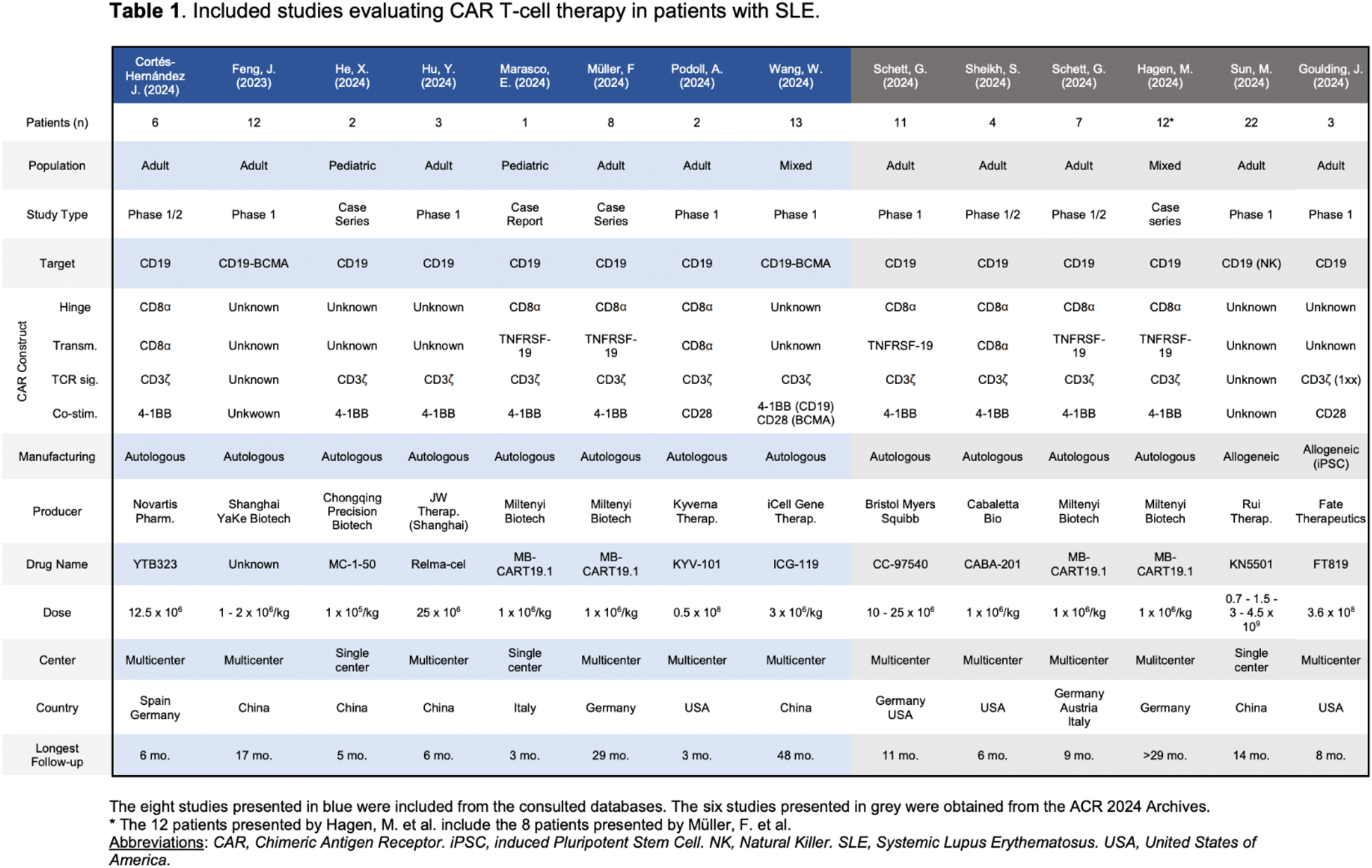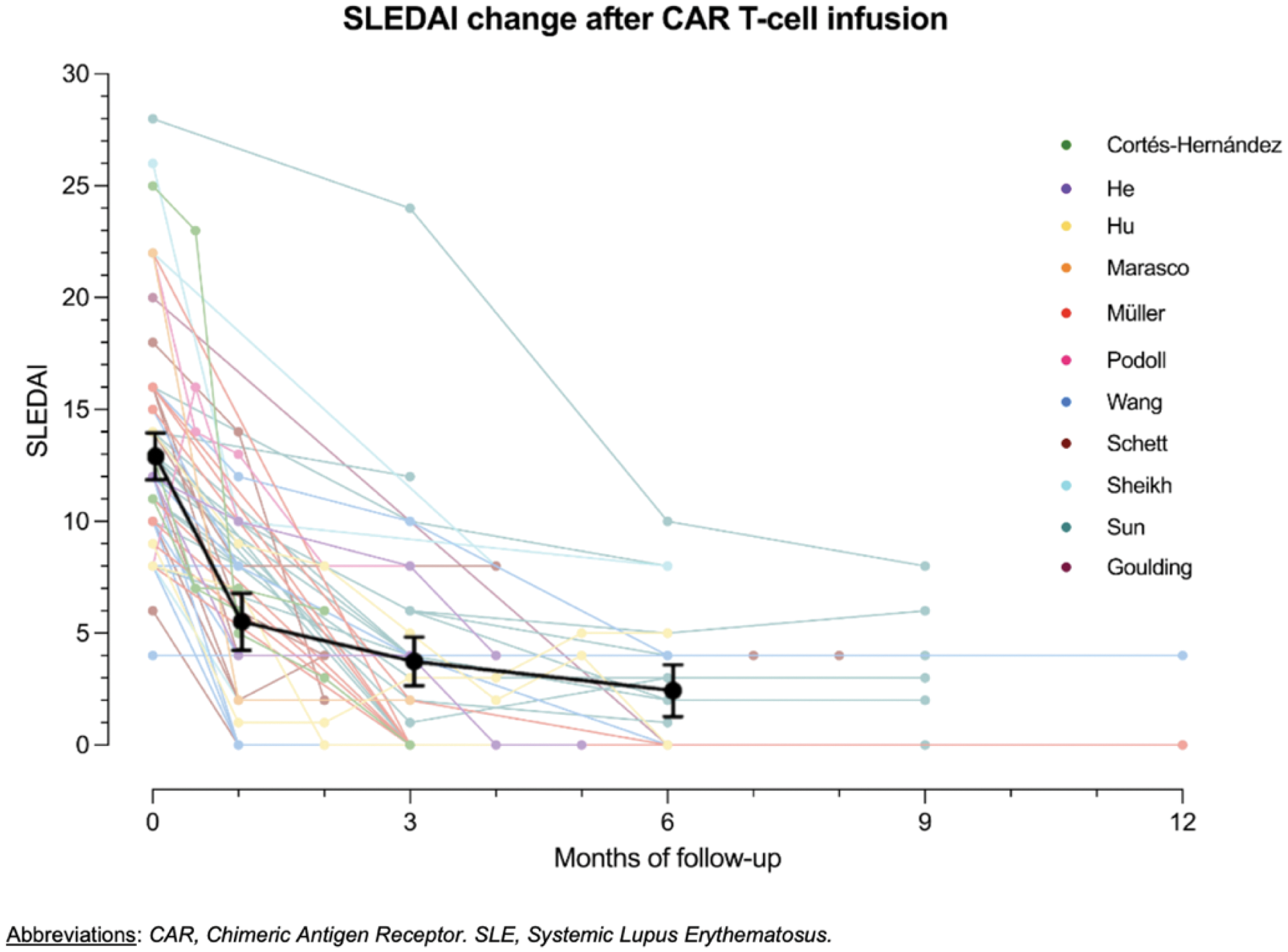

Background: CAR T-cell therapy is poised to revolutionize the treatment of systemic lupus erythematosus (SLE). Recently, several authors have reported their experience using CAR T-cell therapy for patients with SLE; nonetheless, all studies are limited by a reduced sample size. No comprehensive analysis of the evidence has been performed to date.
Objectives: To review and summarize the available clinical evidence published or presented to date on the use of CAR therapy in SLE.
Methods: We conducted a systematic/scoping review to evaluate all clinical studies assessing safety and efficacy outcomes of CAR therapy in SLE. For this review, we followed PRISMA-ScR recommendations. MEDLINE (PubMed), Embase, Scopus, and CENTRAL were consulted, as well as the ACR Convergence 2024 Archives.
Results: The search strategy yielded 4,943 results, of which 14 studies were included in the analysis (including 8 from the consulted databases and 6 from the 2024 ACR Archives). The studies had a combined population of 98 participants. All studies included patients with refractory and active SLE who had failed at least 2 immunosuppressive therapies. Most studies (n=12 [85%]) used a CD19-targetted CAR, with only 2 groups (15%) assessing bispecific CD19-BCMA CAR T-cells. Two studies (15%) evaluated allogeneic CAR products. All groups reported successful B-cell depletion, typically achieved within 1–3 weeks following CAR infusion, and B-cell reconstitution was observed after 2-3 months by most groups. Pooled analysis of the 63 individual SLEDAI scores available showed a median decrease in SLEDAI of 6 points (IQR: 3.5 - 8.5) at month 1, 8 points (IQR: 6 - 9.3) at month 3, and 8 points (IQR: 6 - 12) at month 6. The mean baseline SLEDAI of 12.8 (95% CI 11.7-13.8) decreased to 3.6 (95% CI 2.5-4.7), and 2.3 (95% CI 1.1-3.5) after 3 and 6 months; respectively. Thirty-one (48%) had a SLEDAI score of 0 at their last follow-up, and 59 (91%) had a score of 4 or less. Cytokine release syndrome (CRS) occurred in 56 (57%) participants, of which 50 (89%) were grade 1, 5 (9%) grade 2, and 1 (2%) grade 3. Immune effector cell-associated neurotoxicity syndrome (ICANS) was reported in 3 patients (3%), 1 grade 1, 1 grade 3, and 1 grade 4. Among the 5 studies analyzing B-cell phenotypes, all reported a marked increase in naïve B-cell populations (CD20+, CD27−) alongside a significant reduction in memory B-cells (CD20+, CD27+). Among the 40 patients in which serum biomarkers were measured, anti-dsDNA levels significantly decreased in 36 patients (90%) and normalized in 29 (72.5%). Complement levels normalized in 37 patients (92.5%).
Conclusion: This systematic/scoping review showed consistent efficacy with decrease in SLEDAI from 12.8 at baseline to 2.3 at 6 months after CAR T-cell. CRS and ICANS were milder and less frequent than expected from oncology data. The findings further support the efficacy and safety of this treatment modality while highlighting the need for additional research to better define its role in SLE management.
REFERENCES: NIL.


Acknowledgements: NIL.
Disclosure of Interests: Alberto Nordmann-Gomes: None declared, Leila Khalili: None declared, Wei Tang: None declared, Laura Geraldino-Pardilla BMS, AstraZeneca, Biogen, GSK, Aurinia, Yevgeniya Gartshteyn: None declared, Robert Clancy: None declared, Maya Souvignier: None declared, Stephen Suh: None declared, Michel Sadelain The Sadelain lab has pending collaborative research agreements with Fate Therapeutics and Alaya.bio
Memorial Sloan Kettering Cancer Center has licensed Sadelain lab CAR technologies to Juno/Celgene/BMS, Takeda Pharmaceuticals, Fate Therapeutics, Atara Biotherapeutics,
Minerva Biotechnologies, Alaya.bio and Senescea, Anca Askanase Abbvie, Amgen, AstraZeneca, Aurinia, Biogen, BMS, Cabaletta, Celgene, Eli Lilly, Idorsia, Janssen, Genentech, GSK, Mallinckrodt, NKARTA, Pfizer, Sana, Sanofi, and UCB, AstraZeneca, BMS, Cabaletta, Idorsia, Genentech, NKARTA, Sana, Sanofi, and UCB.
© The Authors 2025. This abstract is an open access article published in Annals of Rheumatic Diseases under the CC BY-NC-ND license (